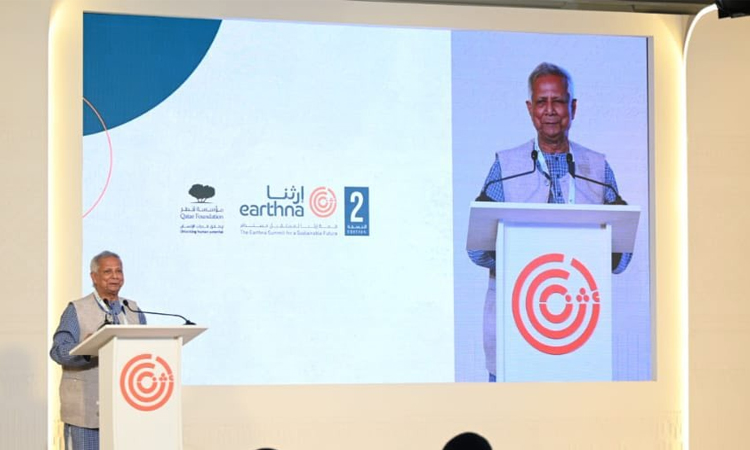News Flash

DOHA (Qatar), April 22, 2025 (BSS) - Chief Adviser Professor Muhammad Yunus today said access to finance is critical for sustainable development, good governance and empowerment of women and youth.
"Access to finance is critical for advancing the interconnected goals of sustainable development, good governance, and the empowerment of women and youth," he said while delivering his keynote speech at Earthna Summit in Doha, Qatar.
The chief adviser said to build such an inclusive atmosphere, the world needs to act on a shared responsibility to create systems that serve humanity - especially those who have been left furthest behind.
"In this venture of ours of a new kind of economics-one that centers on people, not just profit; one that builds resilience instead of deepening inequality can play a prominent role," he said.
Prof Yunus mentioned that he spoke once again about social business, financial inclusion, and microfinance - not as abstract concepts, but as practical tools to empower the poor, transform lives, and thus build a just, inclusive and sustainable society for the humanity.
He said a truly inclusive society must create political and economic space for the marginalised groups, while they are often cornered communities whose voices must be heard.
"Access to finance amplifies their political voice and expands their freedom of choice," he said.
"As I have said time and again that economic and financial planning rooted in the concept of personal gain have failed too many and brought our planet to the brink. Hence, we need to focus on social business-a model I have championed as a complement to traditional capitalism," he said.
The chief adviser said a social business is a business that was designed to solve social problems while it is financially self-sustaining, but it does not exist to maximise personal gain.
Rather, he said, it exists to maximise social good.
He said, "Social businesses offer a revolutionary space where innovation meets compassion. They address issues such as healthcare, clean water, education, and climate resilience - not as charity, but as business".
"And that changes everything. It creates accountability. It ensures sustainability. And it unleashes a new wave of purpose-driven enterprise," Prof Yunus said.
He said the impact of social business is now felt globally as universities are establishing social business centres.
"Multinational corporations are creating social businesses. Thousands of young entrepreneurs are launching ventures to solve problems in their communities," he added.
The chief adviser said social business funds are financing unemployed youth, empowering them to become job creators rather than job seekers.
"Microcredit or ensuring access to finance for everyone is another critical sector which we cannot ignore if we want to ensure a sustainable and resilient future or everyone," the chief adviser said.
"The idea of microfinance - has already reached hundreds of millions across the globe. And yet, the deeper truth remains: access to finance is not just about money. It is about dignity. It is about agency." he said.
Prof Yunus said microcredit is about unlocking human potential that has been buried under generations of neglect and structural inequality.
"We need to keep in mind that financial inclusion is not a matter of charity. It is a matter of justice. The exclusion of the poor from the financial system is one of the most powerful tools of disempowerment in our time," he said.
The chief adviser said when people do not have access to capital, they cannot dream, they cannot build, and they cannot participate in shaping their own futures.
"And yet we see over 1.4 billion people globally still unbanked - most of them women, most of them in rural areas, most of them yearning for an opportunity," he said.
By democratising finance, he said a path is created for people to become job creators rather than job seekers. "That is the essence of entrepreneurship - of human creativity being put to work, not for maximum profit, but for maximum impact," he said.